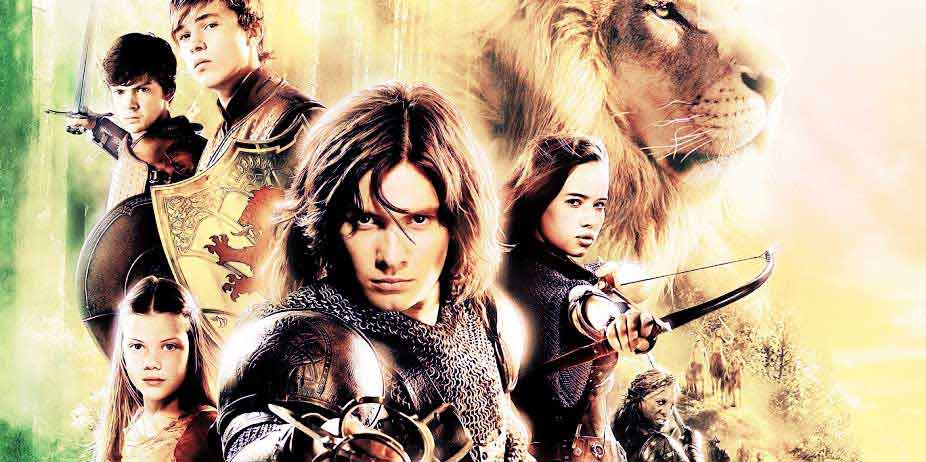
The Chronicles of Narnia: Prince Caspian (2008)
Piercing cries waft through the darkened corridors of the castle. A son has been born to the Lord Protector of the realm and as such, the heir to the throne, Prince Caspian (Ben Barnes), is now in danger. Warned to flee by his professor and dearest friend, who has told him many stories of the magical creatures of the neighboring kingdom of Narnia, Caspian rides out into the darkness to avoid being assassinated by his uncle's ruthless soldiers. In peril, he gives one blast on the horn his professor gave him, a mythical instrument said to summon past kings and queens to the aid of whomever possesses it. The echo resonates through Narnia and penetrates our world, where the Pevensie children are contemplating their "normal" existence in war-torn London. It has been a year since they stumbled in and out of the wardrobe and were kings and queens in Narnia.
It's Peter (William Moseley) who is having the hardest time readjusting. Scrapping constantly at school and dealing with being "just a kid again," he relies heavily on his younger but wiser brother Edmund (Skandar Keynes) to keep him in line. Susan (Anna Popplewell) is of an age where boys are interested in her but she could care less, and Lucy (Georgie Henley) just wants to return to Narnia and sink her fingers into Aslan's soft fur. Standing on a platform waiting for the train that will take them off to school, none of the children are prepared when magic breaks through the barrier between the two worlds and leaves them standing on a Narnian beach. Thirteen hundred years have passed since they were seated on the four thrones at Car Paraval. Narnia has been overrun by its enemies and most of the talking creatures have gone into hiding, the trees retreating so far into themselves that no one can summon them forth.
Together, the children and Caspian, as well as the dwarves Trumpkin and Nikabrik (Peter Dinklage, Warwick Davis), and a feisty mouse called Reepicheep must defeat their enemies and restore the right powers to the Narnian throne... with or without the assistance of Aslan, whom it is believed has abandoned them. The result is two and a half hours of incredible computer animation, stunning fight sequences, and a blend of character development and subtle humor that I feel the author would be proud of. Many of the wonderful images from the book have been brought to life and others taken a step further. The sequence with the White Witch in particular is absolutely magnificent. Changes have been made to the structure in order to maintain plot development, but none of them were so peculiar that they felt out of place. Caspian is of course much older than in the book, and there's a bit of romantic tension between him and Susan. He and Peter also have a natural friction that eventually turns into respect. It's brilliant. It has taken everything a step further than in the first film without overshadowing it. The musical score borrows heavily from the first to give us a sense of remembrance but also has some wonderful new battle songs. The scale of the warfare has been increased.
Even though the rating is only PG, there are a lot of battle and action sequences that result in a heavy body count. Your heart will break to see loyal Narnians fall beneath a barrage of arrows, or cut down in a skirmish. Giant chasms open in the earth and swallow men whole; trees rip up their roots and use them to smash into enemy lines. Characters are badly wounded in battle. Peter faces another king in one to one combat intending to "fight to the death." There is one mention of the term "magic," but as with all of Lewis' stories, the term itself is not indicative of what it actually is. Dark magic is used to lure the White Witch from her imprisonment, but ultimately the battle is won through the forces of good uniting in a common goal. Lewis always meant for his stories to be allegories and while the symbolism is not as obvious in this installment, Christian audiences will recognize more subtle instances of grace.
The most obvious change is in Edmund, whose heroism and humility sets him apart from Peter. The instigator of much torment in his first adventure in Narnia, he has been redeemed and is a completely different person. I was also pleased that my favorite dialogue from the book made it into the film, when Lucy runs forward to embrace Aslan and remarks, "Aslan, you've grown!" That he has... and every year she grows larger, he will too. My one minor complaint is that the Telimarian accents are so thick that there were times when I had trouble understanding them. But really, that's a nitpick in the face of brilliance.
